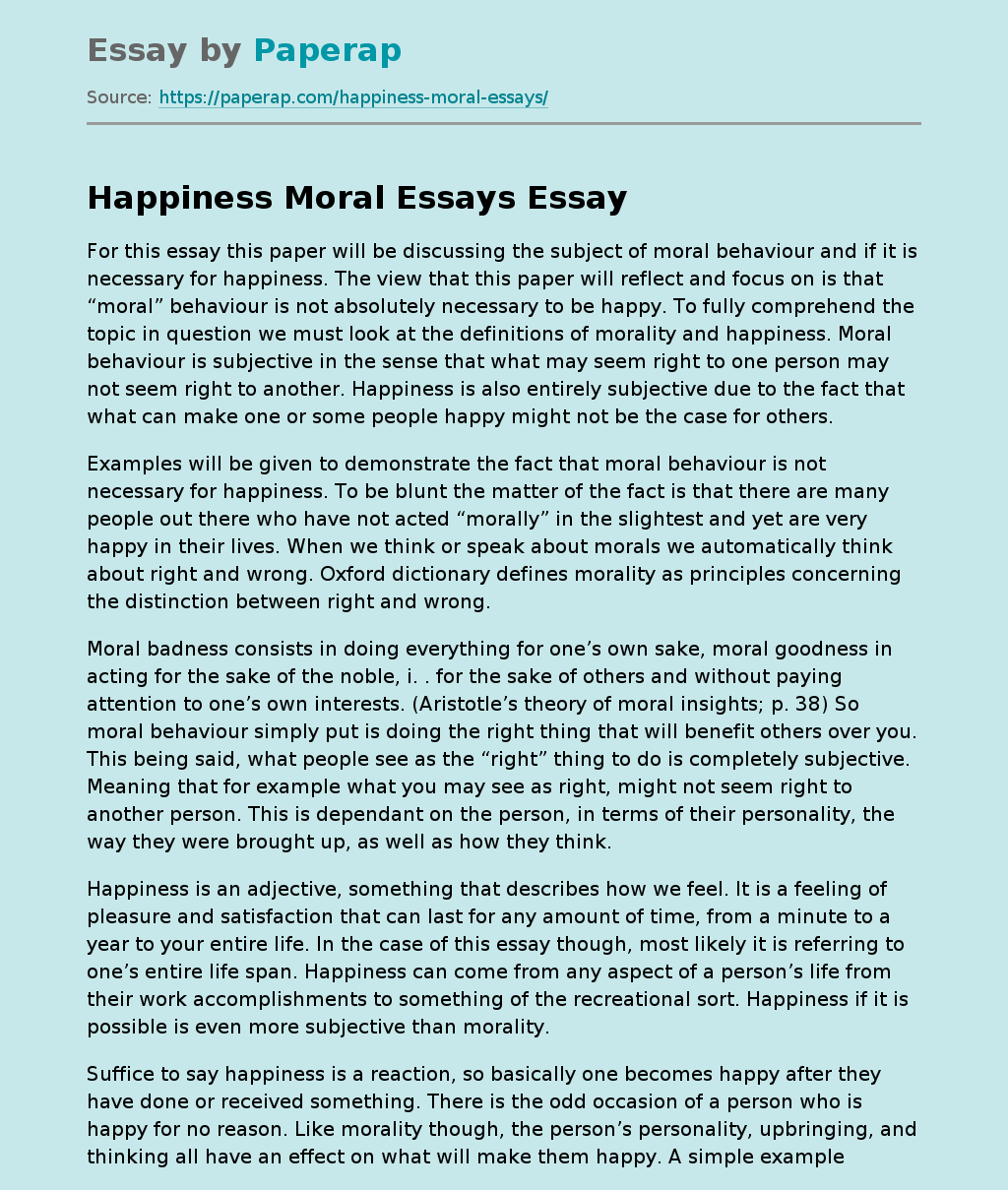Happiness Moral Essays
For this essay this paper will be discussing the subject of moral behaviour and if it is necessary for happiness. The view that this paper will reflect and focus on is that “moral” behaviour is not absolutely necessary to be happy. To fully comprehend the topic in question we must look at the definitions of morality and happiness. Moral behaviour is subjective in the sense that what may seem right to one person may not seem right to another. Happiness is also entirely subjective due to the fact that what can make one or some people happy might not be the case for others.
Examples will be given to demonstrate the fact that moral behaviour is not necessary for happiness. To be blunt the matter of the fact is that there are many people out there who have not acted “morally” in the slightest and yet are very happy in their lives. When we think or speak about morals we automatically think about right and wrong.
Oxford dictionary defines morality as principles concerning the distinction between right and wrong.
Moral badness consists in doing everything for one’s own sake, moral goodness in acting for the sake of the noble, i. . for the sake of others and without paying attention to one’s own interests. (Aristotle’s theory of moral insights; p. 38) So moral behaviour simply put is doing the right thing that will benefit others over you. This being said, what people see as the “right” thing to do is completely subjective.
Meaning that for example what you may see as right, might not seem right to another person. This is dependant on the person, in terms of their personality, the way they were brought up, as well as how they think.
Happiness is an adjective, something that describes how we feel. It is a feeling of pleasure and satisfaction that can last for any amount of time, from a minute to a year to your entire life. In the case of this essay though, most likely it is referring to one’s entire life span. Happiness can come from any aspect of a person’s life from their work accomplishments to something of the recreational sort. Happiness if it is possible is even more subjective than morality.
Suffice to say happiness is a reaction, so basically one becomes happy after they have done or received something. There is the odd occasion of a person who is happy for no reason. Like morality though, the person’s personality, upbringing, and thinking all have an effect on what will make them happy. A simple example of this: Bob and Mary and brought up in two different homes, environments, with different family values. Now as teenagers Mary finds it a drag to look for and have a job, whereas Bob gets satisfaction out of working because it is a part of his upbringing.
When talking about if moral behaviour is necessary for happiness, one must think about how it affects society vs. the person. “If there are no consequences to “immoral behaviour,” then there is no motivational pressure for morality. ” this quote by Plato can be viewed as the fact that if there were no consequences, there would be much more “immoral” behaviour because it is simply easier to do. In a study of human nature done by it has been proven that humans like to take the easier root.
Immoral behaviour is exactly that the easier root, which in turn makes it immoral in one way or another. To put it plainly there are many people out there who have acted immorally and yet are happy to this very day with their lives. In conclusion, it is not necessary to behave morally to achieve happiness. With morality and happiness being as subjective as they are, especially in the world we live in today with all this greed, immoral behaviour will seem much more appealing to the average person.
This is due to the fact that “immoral” actions can create a shorter and quicker path towards instant gratification inducing happiness in a person. You know what they say; you don’t have to be perfect to be happy!
Happiness Moral Essays. (2019, Dec 05). Retrieved from https://paperap.com/happiness-moral-essays/

